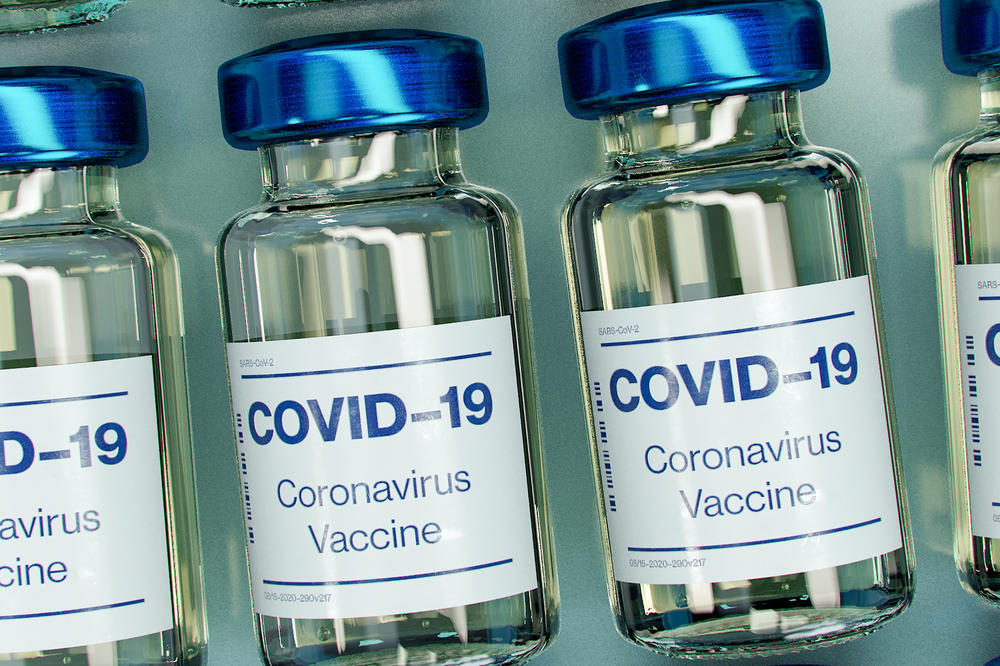Lethal Patents: Europe and America Protect the Pharmaceutical Industry – Not Their Citizens
by Harald Schumann
№ 30/2021 from Apr 15, 2021
Together with the USA, the EU states are blocking the release of vaccine patents in the WTO and thus preventing an effective fight against the virus in the countries of the global south. This is reprehensible on humanitarian grounds and causes long-term political and economic damage, as Harald Schumann argues in his blog post.
Covid-19 Vaccine Bottle
Image Credit: Daniel Schludi (Unsplash)
At the beginning of February 2021, Angela Merkel and Emmanuel Macron, together with European Commission President Ursula von der Leyen, published a remarkable statement that included the message that “[t]he COVID-19 crisis” is “the greatest test of global solidarity in generations”. Accordingly, in a joint appeal, Europe’s leading politicians called for a “strong and internationally coordinated response that rapidly expands access to vaccines and recognises comprehensive immunisation as a global public good that must be available and affordable to all”.
This sounded extremely humane – and was deeply dishonest. The three EU politicians are in a leading position for the most dangerous political mistake in the fight against the pandemic: Together with the US government, they have refused to transfer the technical knowledge for free, which would also enable the poorer states of the Global South to develop their own vaccine production and thus actually make immunisation “available and affordable to all”. Instead, they adamantly defend the privilege of the pharmaceutical companies to safeguard the technology from reproduction through patents and thus generate completely inflated profits with it worldwide.
This is not only reprehensible on humanitarian grounds, but it will also cause massive damage to the citizens of their own states. It is foreseeable that the virus, due to the lack of vaccine, will continue to spread unhindered in Latin America, Africa, and Asia. As documented by the recent case of the virus variant P1 in Brazil, this results in the development of dangerous mutations, against which the vaccines are no longer effective. These would then inevitably spread again globally, and thus extend the pandemic indefinitely; the economic and political consequences would be disastrous. The UN General Secretary António Guterres summarised the consequences in a tweet: “Vaccine nationalism is not only unfair, it is self-defeating. No one country will be safe from #COVID19 until all countries are safe.”
As obvious as this truth is, the governments of the wealthy countries have ignored it. Many OECD countries, including Germany and France, do contribute to the World Health Organisation's (WHO) COVAX initiative with aid payments, thus providing access to vaccines for the poorer countries. However, its scope is far too limited. By the end of the year, the program will have supplied a maximum of 2.3 billion vaccination doses, only reaching a third of the population for which COVAX has been conceived.
This makes it all the more important to create additional production capacity. The companies capable of this already exist, even in the poor South – but not the money needed to buy the licenses on patents and the technical knowledge. That is why as early as October 2020 the governments of India and South Africa applied to the World Trade Organisation (WTO) for the patent rights for COVID-19 vaccines to be suspended until the end of the pandemic. The WTO agreement on Trade-Related Aspects of Intellectual Property Rights (TRIPS) even has an explicit provision for such a suspension in the case of an emergency. However, the US and EU states, including Germany, flatly rejected the request in the WTO Council. The spokeswoman for the German Federal Ministry of Justice stated that the application is, “in the opinion of the Federal Government, not expedient”. Instead, in an embarrassing reiteration of the position of the pharmaceutical companies, she explained that “the adequate protection of intellectual property rights provides an important market-based incentive for the development of medicines and vaccines by private companies”. The General Director of the International Federation of Pharmaceutical Manufacturers & Associations (IFPMA), Thomas Cueni, justified the blockade as follows: “Even if the patents were to be suspended, not a single additional dose would reach the people”. Building a factory capable of manufacturing the complex new vaccines would take three to five years.
However, these arguments are grossly misleading. The development of the COVID-19 vaccines was almost entirely paid for by the taxpayers – there is nothing “market-based” about it. The German company BioNTech alone, whose vaccine is marketed worldwide by the pharmaceutical giant Pfizer, received around half a billion euros in subsidies and state credit. According to Doctors Without Borders, AstraZeneca received about 1.5 billion euros, and the US company Moderna pocketed more than 2 billion. No one can justify why these state investments should now serve private profits by means of the patents for the next 20 years, while billions of people continue to be exposed to the virus without protection. The claim that the countries of the South would not be able to produce the vaccine in time is even more absurd. Vaccine production has long existed in Brazil, South Africa, and many others. India alone is already home to 60 percent of global vaccine production. Why should the companies there not be able to establish new vaccine factories just as quickly as Pfizer and others in Europe and America?
The argument not only exposes the latent racism of the beneficiaries, it also causes massive geo-political damage. While America and Europe protect the parasitic business model of their pharmaceutical industry, Russian and Chinese governments are readily exploiting the gap, offering their vaccines to poor countries largely at cost price. If the Western democracies have any moral superiority left, it most certainly will be lost after this.
Harald Schumann is a German author and investigative journalist. He has been an editor at the Tagesspiegel since 2004 and has published several academic and non-fiction books as well as several documentaries.

